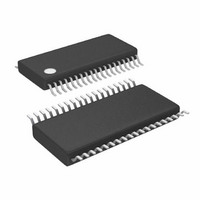LTC3855IFE#PBF Linear Technology, LTC3855IFE#PBF Datasheet - Page 24

LTC3855IFE#PBF
Manufacturer Part Number
LTC3855IFE#PBF
Description
IC CTLR DC/DC MULTIPHASE 38SSOP
Manufacturer
Linear Technology
Series
PolyPhase®r
Type
Step-Down (Buck)r
Datasheet
1.LTC3855EUJPBF.pdf
(44 pages)
Specifications of LTC3855IFE#PBF
Internal Switch(s)
No
Synchronous Rectifier
Yes
Number Of Outputs
2
Voltage - Output
0.6 ~ 3.3 V, 0.6 ~ 12.5 V
Current - Output
25A
Frequency - Switching
250kHz ~ 770kHz
Voltage - Input
4.5 ~ 38 V
Operating Temperature
-40°C ~ 125°C
Mounting Type
Surface Mount
Package / Case
38-TSSOP Exposed Pad, 38-eTSSOP, 38-HTSSOP
Lead Free Status / RoHS Status
Lead free / RoHS Compliant
Power - Output
-
Available stocks
Company
Part Number
Manufacturer
Quantity
Price
LTC3855
applicaTions inForMaTion
INTV
The LTC3855 features a true PMOS LDO that supplies
power to INTV
gate drivers and much of the LTC3855’s internal circuitry.
The linear regulator regulates the voltage at the INTV
to 5V when V
INTV
needed power when its voltage is higher than 4.7V. Each
of these can supply a peak current of 100mA and must
be bypassed to ground with a minimum of 4.7µF ceramic
capacitor or low ESR electrolytic capacitor. No matter
what type of bulk capacitor is used, an additional 0.1µF
ceramic capacitor placed directly adjacent to the INTV
and PGND pins is highly recommended. Good bypassing
is needed to supply the high transient currents required
by the MOSFET gate drivers and to prevent interaction
between the channels.
High input voltage applications in which large MOSFETs
are being driven at high frequencies may cause the maxi-
mum junction temperature rating for the LTC3855 to be
exceeded. The INTV
gate charge current, may be supplied by either the 5V linear
regulator or EXTV
is less than 4.7V, the linear regulator is enabled. Power
dissipation for the IC in this case is highest and is equal
to V
on operating frequency as discussed in the Efficiency
Considerations section. The junction temperature can be
estimated by using the equations given in Note 3 of the
Electrical Characteristics. For example, the LTC3855 INTV
current is limited to less than 44mA from a 38V supply in
the UJ package and not using the EXTV
To prevent the maximum junction temperature from being
exceeded, the input supply current must be checked while
operating in continuous conduction mode (MODE/PLLIN =
SGND) at maximum V
V
off and the EXTV
remains on as long as the voltage applied to EXTV
above 4.5V. Using the EXTV
and control power to be derived from one of the LTC3855’s
switching regulator outputs during normal operation and
CC
T
J
rises above 4.7V, the INTV
IN
CC
CC
= 70°C + (44mA)(38V)(33°C/W) = 125°C
• I
Regulators and EXTV
through a P-channel MOSFET and can supply the
INTVCC
IN
CC
CC
is greater than 5.5V. EXTV
. The gate charge current is dependent
from the V
CC
is connected to the INTV
CC
. When the voltage on the EXTV
IN
current, which is dominated by the
. When the voltage applied to EXT-
IN
CC
CC
CC
supply. INTV
allows the MOSFET driver
linear regulator is turned
CC
CC
CC
supply:
CC
. The EXTV
connects to
powers the
CC
remains
CC
CC
pin
pin
CC
CC
CC
from the INTV
(e.g., start-up, short-circuit). If more current is required
through the EXTV
diode can be added between the EXTV
Do not apply more than 6V to the EXTV
sure that EXTV
Significant efficiency and thermal gains can be realized by
powering INTV
resulting from the driver and control currents will be scaled
by a factor of (Duty Cycle)/(Switcher Efficiency).
Tying the EXTV
temperature in the previous example from 125°C to:
However, for 3.3V and other low voltage outputs, addi-
tional circuitry is required to derive INTV
the output.
The following list summarizes the four possible connec-
tions for EXTV
1. EXTV
2. EXTV
3. EXTV
4. EXTV
For applications where the main input power is below 5V,
tie the V
pins to the 5V input with a 1Ω or 2.2Ω resistor as shown
in Figure 10 to minimize the voltage drop caused by the
gate charge current. This will override the INTV
regulator and will prevent INTV
T
INTV
resulting in an efficiency penalty of up to 10% at high
input voltages.
normal connection for a 5V regulator and provides
the highest efficiency.
external supply is available, it may be used to power
EXTV
gate drive requirements.
work. For 3.3V and other low voltage regulators,
efficiency gains can still be realized by connecting
EXTV
boosted to greater than 4.7V.
J
= 70°C + (44mA)(5V)(33°C/W) = 77°C
IN
CC
CC
CC
CC
CC
CC
CC
and INTV
to be powered from the internal 5V regulator
providing it is compatible with the MOSFET
connected to an output-derived boost net-
to an output-derived voltage that has been
connected to an external supply. If a 5V
left open (or grounded). This will cause
connected directly to V
CC
CC
CC
CC
CC
:
CC
< V
pin to a 5V supply reduces the junction
from the output, since the V
when the output is out of regulation
CC
than is specified, an external Schottky
IN
pins together and tie the combined
.
CC
from dropping too low
CC
OUT
and INTV
CC
CC
. This is the
pin and make
power from
IN
CC
CC
current
linear
pins.
3855f













